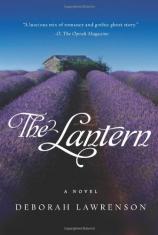Reading Group Guide
Discussion Questions
The Lantern

1. How does the prologue set the tone of The Lantern?
2. What attracts Eve to Dom? How does their relationship change over the course of the novel? Are they unrealistic in what they want from each other?
3. At the beginning of the novel, Eve confesses, “living there, waking up to it each morning, I felt as if life --- my real life, that was, the life I had always been hoping to have --- had truly begun.” What does this tell us about her? Why didn’t she feel as if her life was real before Dom? How does this revelation shape your feelings toward her character?
4. Eve and Dom live in a “private universe” of [their] own devising” that feels “like what we both wanted and needed.” How does this cocoon of love and romance protect each of them? How does it eventually undermine their relationship?
5. The Lantern is a story of isolation, silence, secrets, and of cause and effect --- how the things we do, or do not do, reverberate through our lives, often in unexpected ways. Can you think of some examples from the book that capture how the author illuminates these themes?
6. The Lantern is told from the viewpoints of two women, Eve and Benedicte. What ties the women together? How are they different? How do their choices and how they see themselves affect events as they unfold?
7. To what extent does Eve’s love of reading and awareness of her own imaginative tendencies influence her perceptions of Dom, of Les Genevriers, and of her situation?
8. “Benedicte has never believed in ghosts. But the house is full of spirits.” What distinction does the author mean to make between the two? Do you think there is a connection between the dead and the living that goes beyond memory?
9. How does the author examine the many ways that one can be haunted? Is a place --- in this case Les Genevriers --- or the person who lives there haunted? How would you answer for Benedicte, Eve, and even Dom?
10. How does the past haunt the present in the novel? Can we truly forget or escape the past? Is the past a curse, a gift, or both? How does the author tie past and present together throughout the novel?
11. Why is Dom reluctant to tell Eve the truth of his first marriage? Who is he trying to protect?
12. How does the author use the atmosphere of Les Genevriers to reflect Eve’s changing mood as she uncovers the truth of her husband, her marriage, and her home?
13. What is the role of nature and the natural world in The Lantern? How does the evocation of the landscape around Eve and Dome enhance the story from their first meeting to the end?
14. As she slowly begins to learn more about Dom’s first wife, Rachel, Eve is reminded of a number of classic novels: Rebecca, Madame Bovary, Anna Karenina, Crime and Punishment. If you have read any of these other books, how do you think they relate in tone and theme to The Lantern?
15. What is the significance of the zoetrope?
16. As Eve comes closer to the truth she remarks, “We all tell stories about ourselves, some repeated so often that we can honestly believe them to be the truth. Stories are our self-protective coating. Everyone has them not only the people who have survived terrible families, though clearly they will have a larger canon than most.” Do you agree with her? Are our personal stories “self-protective coating?” Explain.
17. The Lantern is told from Eve’s perspective. How would the story change if it had been told by Dom? How differently might we see Eve and their relationship? Is Eve a reliable narrator? What insights does the novel offer concerning the narratives we create about our own lives?
18. What did you take away from reading The Lantern?
The Lantern
- Publication Date: February 28, 2012
- Genres: Fiction
- Paperback: 400 pages
- Publisher: Harper Paperbacks
- ISBN-10: 0062192973
- ISBN-13: 9780062192974







